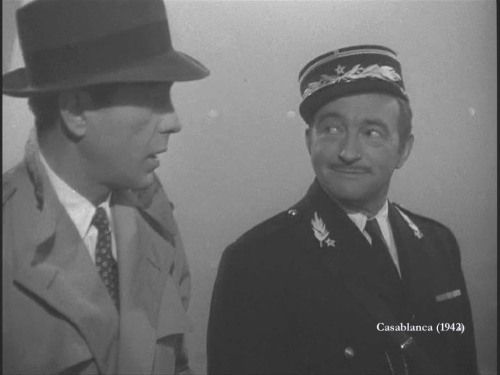And there are indeed echoes from the famous line in Casablanca from where the term originates
It seems there will be a summit between presidents Trump and Putin to discuss Ukraine in the absence of Ukraineand Europe. There has been no diplomatic preparation for a summit, but Trump is not one for diplomatic formalities or the sensitivities of friends and allies.
The last time he met Putin at a summit for a tete-a-tete was in 2018 in Finland, and it was the beginning of a beautiful friendship at the end of which Trump told reporters he trusted Putin’s denial of Russian interference in the US election more than his own intelligence services.
Putin also got on well with the previous republican President, George W Bush who told reporters at the 2001 summit in Slovenia that he looked Putin in the eye and got a sense of his soul and thought he was trustworthy. Democrat presidents Clinton, Obama and Biden found Putin difficult to like. Clinton, who presided over Nato expansion eastwards, never warmed to Putin, while Obama and Biden had to deal with Russia’s involvement in Syria and invasion of Ukraine in 2014 and 2022 and thought him chippy and awkward.
By 2007, Putin fell out of love with the US and the west. In that year he told the security conference in Munich that he thought US world domination dangerous, Nato expansion eastwards a provocation, US missile defence plans in East Europe were aimed at Russia not Iran and that the west imposed its value system on the world as if it were superior but which he considered too woke for Russia before woke became a word in the dictionary.
It was the beginning of the end of the post-Cold War peace window that was kept open a few years past its closing by the skilful leadership of chancellor Angela Merkel of Germany who knew and understood Russia well.
What then happened in the US was a sea change in its value system; it became anti woke as the maverick Donald Trump, for whom the authoritarian Putin was a role model, became US president twice in 2017-21 and 2025.
We’ve been here before, in the 1930s when authoritarian leaders like Hitler in Germany, Stalin in Russia, Ataturk in Turkey, Mussolini in Italy and Franco in Spaincame to power in Europe. Ataturk was a benevolent despot who preached peace at home and peace in the world and had himself a beautiful friendship with Greek prime minister Eleftherios Venizelos, but the others were malevolent and evil and drove Europe into World War II in which millions died.
The summits between British Prime Minister Neville Chamberlain and Adolf Hitler over the fate of Czechoslovakia in 1938 gave summitry a bad name. The agreement at the final Munich summit for Nazi Germany to annex part of Czechoslovakia in the absence of the Czech leadership was not peacemaking but appeasement.
The summits at Versailles in 1919 and at Yalta and Potsdam between Roosevelt/Truman, Stalin and Churchill in 1945 were not appeasement although they often created states and their borders without the involvement of the nations themselves.
On the other hand, summits like the one between Nixon and Mao Zedong in 1972 paved the way for the US to recognise the People’s Republic of China, and those between the Soviet Union’s Gorbachev and western leaders – Thatcher, Reagan and Bush – in the 1980s ended the Cold War and brought peace in our time for a while.
It is natural that Ukraine is suspicious of the summit between Trump and Putin in its absence, fearing that Trump might do a Chamberlain on Ukraine. But as the survivors of the US nuclear attack on Hiroshima in 1945 warned last week, on its 80th anniversary, the terrifying prospect of a nuclear catastrophe is closer on account of the war in Ukraine.
Whatever reservations there may be, a summit between the US and Russia to end the war in Ukraine is of paramount importance. Most people prefer a US president with a beautiful friendship with Putin seeking the Nobel Peace Prize than the heroic outbursts of former president Biden who preferred to hurl insults at Putin.
It was not Trump who called his friendship with Vladimir Putin a beautiful friendship although it is the sort of thing he would say. Actually it was inspired by one of the two most quotable lines from the classic film Casablanca.
Spoiler alert. At the end of the film Ricky (Humphrey Bogart) shoots dead a Nazi officer at an airport as he helps his former lover and her new husband escape Nazi-occupied Casablanca under French colonial rule. But when the French police arrive to arrest him, police captain Louis Renault (Claude Rains) covers up for him by ordering them to “round up the usual suspects”. As they leave the airport Ricky warms to Renault’s anti Nazi sympathies saying “Louis, I think this is the beginning of a beautiful friendship.”
These days the beautiful friendship between presidents Trump and Putin is called a bromance that combines brother and romance but does not compare well with Ricky’s beautiful friendship quip in Casablanca that coincides with Trump’s habit of calling his actions as president beautiful.
The film Casablanca shows us that beautiful friendships can happen between flawed individuals in common pursuit of a higher cause. In the film it was the fight against the Nazis, in the case of Trump and Putin it is the highest cause of all: to avoid a nuclear war that could destroy life on earth.
The latest news is that the rendezvous will take place next Friday in Alaska which is a master move full of symbolism: it is in the US but closer to Russia, which sold it to the US in 1867 for €7.2 million to prevent British expansion from Canada.
Alper Ali Riza is a king’s counsel in the UK and a retired part time judge






Click here to change your cookie preferences